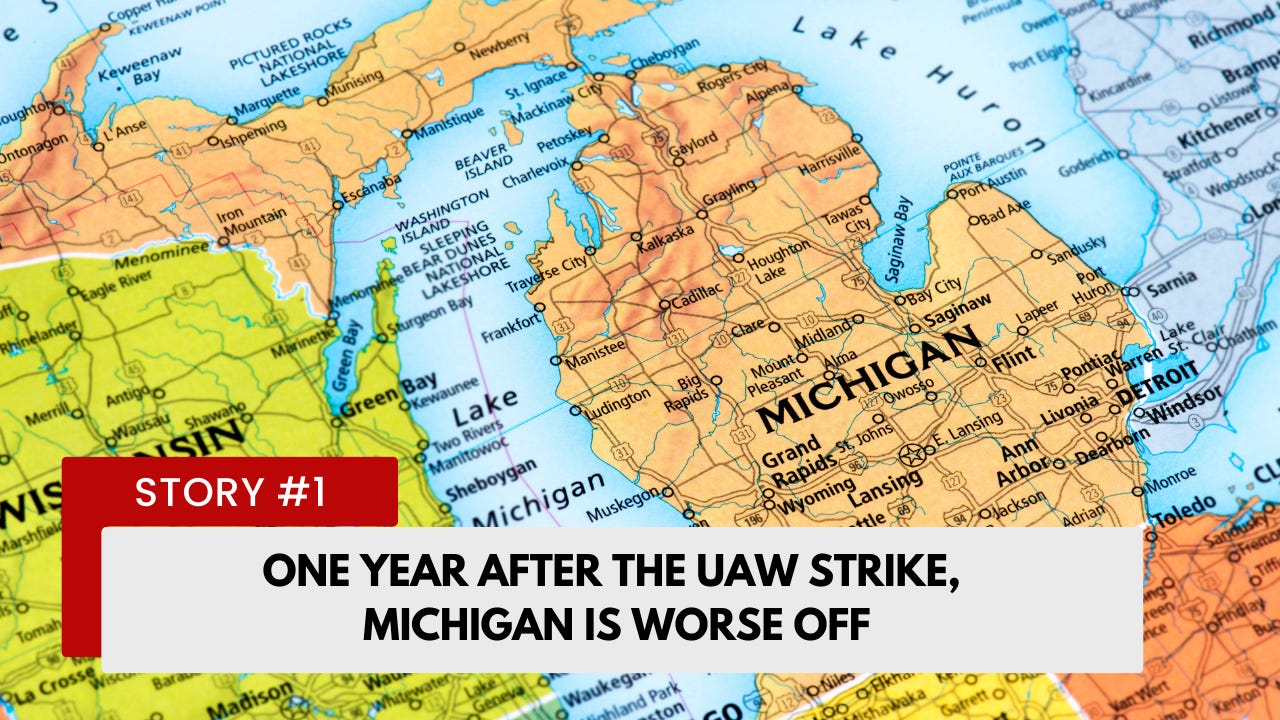Get unfiltered news and real stories for just $5/month – cancel anytime. I left a high-paying job in mainstream media to bring you the truth, and your support as a paid subscriber helps keep this free and empowers me to keep telling the real news.


DETROIT, Mich - It’s been a year since the United Auto Workers went on strike against the Big Three automakers in Michigan. UAW president Shawn Fain trumpeted the resulting contracts as a major win for workers.
But increasingly, the evidence points to the opposite conclusion: The UAW failed its members, who are suffering because of union leaders’ foolish actions and divided focus.
When the UAW pushed the strike, the automakers warned that it would do lasting damage, especially to their ability to invest in Michigan. That has proven true. While the strike resulted in generous new contracts for workers, their employers have begun making painful decisions — cutting and moving jobs, canceling production and scaling back future plans.
Stellantis is laying off 2,450 workers in Warren and cutting hundreds of jobs in Sterling Heights. Over at General Motors, 945 workers in Orion and 350 in Lansing have been let go. Ford’s “Blue Oval” factory has been dramatically downsized. All told, since the UAW strike ended, Michigan has lost auto jobs while the rest of the nation has gained them.
The UAW’s strike last year made all this suffering more likely, since the resulting contracts were too expensive and inefficient for the automakers. But it also doesn’t help that UAW leaders haven’t been as focused on autoworkers as they should be. Click here to read more.

WASHINGTON, DC - U.S. President Joe Biden spoke to Ukrainian President Volodymyr Zelenskiy on Wednesday about efforts to surge security assistance to Ukraine and announced a new $425 million military aid package, the White House said.
The security package includes air defense capability, air-to-ground munitions, armored vehicles and critical munitions, the White House said in a statement.
Zelenskiy, writing on Telegram, expressed gratitude to Biden, both parties of Congress and the American people for the new package and said he spoke to Biden about Kyiv's five-point "victory plan," which he presented to parliament on Wednesday.
The White House pledged that within months the U.S. would send “hundreds” of air defense interceptors and “dozens” of smaller air defense systems, both of which have become as valuable as they are scarce two-and-a-half years into the war. Russia has consistently overwhelmed Ukraine’s air defenses with cheap drones and ballistic missiles in attacks on military and civilian targets.
Kyiv is bracing for more such strikes heading into the winter as Ukraine struggles with a damaged power grid. Click here to read more.

WASHINGTON D.C. - A pair of Department of Education programs meant to boost national security are funding college departments that employ anti-American professors associated with campus anti-Semitism.
The National Resource Centers (NRC) Program and Foreign Language and Area Studies (FLAS) Fellowships program aim to bolster “the security and prosperity of the United States” by training future diplomats and foreign language experts. But these grants often go to university departments housing radical professors whose ideologies clash with that of the United States diplomatic corps.
According to an analysis from OpenTheBooks, Columbia University used its radical professor Dr. Joseph Massad as a selling point in a successful grant application to the Department of Education. Massad called Hamas’ October 7 attack “a stunning victory of the Palestinian resistance.” According to the Middle East Forum, students said Massad “takes a categorically anti-U.S. tack at every possible opportunity,” and lists “the West’s various cultural crimes ad nauseam.”
“In 2002, Massad gave a talk at Columbia called ‘On Zionism and Jewish Supremacy,’” OpenTheBooks said. Click here to read more.

NEW YORK, NY - American journalism has experienced a spectacular collapse in the last 25 years – daily newspaper circulation has declined from over 60 million subscribers to just over 20 million. And the trend is accelerating: According to the Pew Research Organization, the average monthly number of unique visitors to the websites of the country’s top 50 newspapers plummeted 20% in one year from 2021 to 2022.
At the same time, the remaining readership expresses a historically low level of faith that the news they are getting is accurate. Just 32% of Americans say they have a “great deal or a fair amount of trust” in the media, according to polling from Gallup.
If there is a bright spot here, polling has long shown that American consumers trust local media more than the national press. “In 2021, Americans were 17 points more likely to say they trust reporting by local news organizations ‘a great deal’ or ‘quite a lot’ than to trust reporting by national news organizations,” notes a survey done by Gallup and the Knight Foundation. But the rapid consolidation of the news industry has adversely affected the level of trust in the news Americans are consuming. Click here to read more.

WASHINGTON. D.C — The FBI quietly adjusted its annual crime data to show an increase in violent crime from 2021 to 2022.
The agency previously claimed violent crime decreased from 2021 to 2022, touting "an estimated 1.7%" decrease in violent crime between the two calendar years. The revised data, which was first identified by RealClearInvestigations, shows violent crime actually increased during that timeframe.
FBI data summaries reviewed by The National News Desk show the agency originally reported1,253,716 violent crimes in 2021 and 1,232,428 violent crimes in 2022, representing the 1.7% decrease it originally advertised. The updated data summary reported 1,197,930 violent crimes in 2021 and1,256,671 in 2022, showing a starkly different 4.9% jump.
The originally reported decrease in violent crime had been a political talking point for Democrats looking to praise the Biden-Harris administration for its handling of public safety. The revision has also called into question the accuracy of 2023 violent crime data released by the FBI earlier this year, which became a hot topic at the debate between former President Donald Trump and Vice President Kamala Harris. Click here to read more.



















